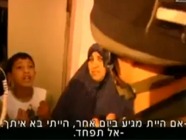
By Ori Nir
Israel TV Channel 2 recently ran a lengthy report of pre-dawn arrests of Palestinian children -- rock-throwing
suspects -- at a West Bank Palestinian refugee camp. The TV crew was embedded with an Israeli unit that raided the
camp.
No, there was no blood, no violent confrontations and no big drama. Everything was done routinely, efficiently, as
if scripted. Including the polite soldiers ("please get dressed") and the business-as-usual reactions of tweens who
moments ago were in bed and are now handcuffed and blindfolded, in a military jeep. One of them, a boy named Ahmad
who seemed around 10, tried to negotiate. "Tomorrow I have an exam. I will be thrown out of school if I don't take
the test," he tried to reason with the soldiers. "Had you come any other day, I would have gone with you. Please!"
Then he manned up and joined the soldiers.
So what's new? What's the big deal, my wife asked me when I told her about the report. That's exactly the point, I
replied. The big deal is that there is nothing new, that this routine has been going on for 46 years. My wife and
I, both former reporters, reminisced about covering such night raids together, more than 26 years ago.
Next month, Israelis and Palestinians will mark the 46th anniversary of the occupation. Think about it: For almost
half a century, Israeli kids in their late teens have been arresting Palestinian kids in their early teens. Night
in, night out, year after year. Guilty or not, justified or not, due process or not -- these are not really the
questions.
What bothers so many Palestinians and Israelis -- among them the six former Israeli General Security Service chiefs
who were interviewed for the award-winning documentary "The Gatekeepers" -- is how routine it has all become.
Israelis and Palestinians live with the perpetuation of the anomaly that the occupation is.
Consider this: Only 7 percent of Palestinians and 19 percent of Israelis are over the age of 55. That means that a
small minority of both populations remembers life without occupation. Only a sliver of the Palestinian public has
any recollection of not living under a foreign military occupation. For Palestinians, resisting the occupation --
the only reality they know -- is a way of life. For Israelis, oppressing the Palestinians is perceived at best as
necessary evil. And so they both live with the banality of this anomaly.
Nissim Levi, a 20-year veteran of the Israeli GSS, several years ago described the impact of this routine. You go
to a Palestinian village to arrest a suspect named Muhammed, he told Israel's Haaretz newspaper. "From the moment
you leave for the village, to take the man and go, you create four more potential terrorists. ... You are entering
a small room, in which five people are sleeping, and in order to get to my Muhammed, I need to step on four
people." He continued: "On the way to enter the village to arrest someone, I already created damage."
How much damage? According to estimates by the Palestinian Authority's Bureau of Statistics, Israel has made more
than 800,000 arrests of Palestinians in the West Bank and Gaza since 1967. That is an average of almost 50 arrests
per day. Go calculate the damage.
Israelis and Palestinians know that their relationship is not normal. They should be shown, however, that it could
be different, that things can change. President Barack Obama and Secretary of State John Kerry are now trying to
launch a process that would do just that. They deserve our support.
This article originally appeared in the Chicago Tribune on May 14th,
2013.
